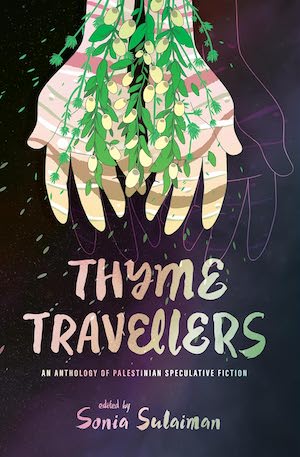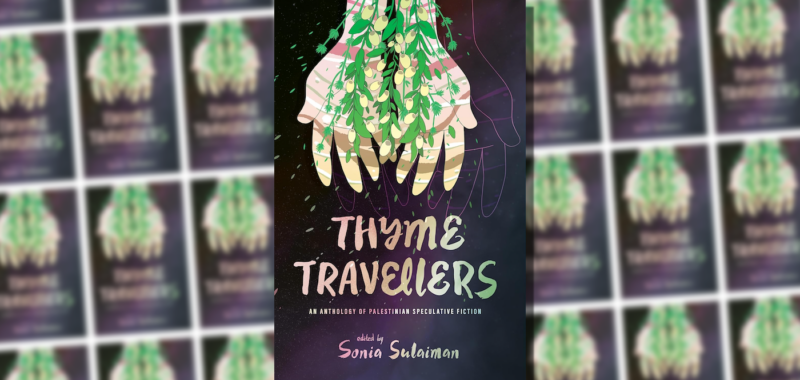It would be tempting to call Thyme Travellers: An Anthology of Palestinian Speculative Fiction “timely,” but the themes, feelings, experiences, and traumas these stories call upon are neither new nor unprecedented. Each is part of a continuum of personal and cultural histories that trace back before any of the authors were born. If you take nothing else from this review, know that this is a fantastic anthology full of talented authors and imaginative premises.
Thyme Travellers, edited by Sonia Sulaiman, isn’t the first anthology of Palestinian speculative fiction ever published, although not many people are aware of the previous ones. LIFTA: Future Palestine blends fiction art, poetry, photography, essays, and even blueprints to ponder the “intangible possibilities and impossibilities.” Similarly, Inara: Light of Utopia gives queer and trans Palestinians different creative formats and mediums to speculate on life in a liberated homeland. Reworlding Ramallah reimagines the future through a Palestinian lens. Palestine +100 also looks to the future, a century after the first Nakba, and tackles the question of what comes next using speculative genres. FIYAH and Strange Horizons, two excellent short speculative fiction magazines that often center marginalized identities, have also done Palestinian-focused issues.
Each of these anthologies are criminally underrated and underread, and each are absolutely stunning examples of speculative Indigenous literature. Sulaiman had her work cut out for her making sure Thyme Travellers could live up to the high bar set by its predecessors, but she more than succeeded. Speaking of Sulaiman, she keeps a running list of speculative fiction by Palestinian authors, one I often refer to. Many of the authors in this anthology have been previously published, and their works are on that list. It’s well worth checking out.
Buy the Book


Thyme Travellers: An Anthology of Palestinian Speculative Fiction
A few stories that stood out to me are worth mentioning here. “Cyrano de AI” by Karl El-Koura and “Generation Chip” by Nadia Afifi are lovely explorations of how technology both helps and hinders. In El-Koura’s near-future Canada, Nait’s father invents cyrano, an AI implant that can do everything from correct colorblindness to suggest conversation topics. Nait and his father have spent so many years letting their enhancements run their relationship that when they finally turn it off over lunch, it’s like they’re meeting each other for the first time. And in Afifi’s near-future Saudi Arabia, the adult grandchildren of a recently deceased grandmother who was one of the hundreds of thousands of Palestinians expelled in the 1948 Nakba are given chips with her memories, dreams, and paths not taken. They must reckon with what they learn about who their grandmother really was and all the things she gave up. Besides the technology piece, the stories are also reflections on what our elders and ancestors felt they had to give up in order to ensure their children had a safe and secure future. I’m not Palestinian, but I saw a lot of my own family—with elders who actually knew people who were the first generation born free from slavery—in these families, particularly in the way it can be hard to talk about the painful parts of your ancestry so you stick to the surface level stuff. It’s easier that way, but the younger generation also misses so much about the steps and missteps that brought them to this point.
Elise Stephens’ “Remembrance in Cerulean” tells of a man, Paul, whose father was responsible for the slaughter of newly arrived aliens called Ceruleans. The Puget Sound colony has had conflict with humans before, although it’s worth asking whether it can even truly be called a “conflict” when all the violence comes from the people who stole the land from someone else while the “other side” are refugees looking for a new place to call home. Paul finds connection in the community of Ceruleans and searches for a way to offer restitution and atonement.
I can’t not talk about the story that opens this anthology, “Down Under” by Jumaana Abdu. No exaggeration, but it is one of the best short fiction stories I’ve read this year. The premise is that Palestinians all around the world are suddenly inspired to tunnel from wherever their diaspora landed back to their homeland. It’s painful, powerful, sharp, and bittersweet. It doesn’t give you the ending you want, nor does it surrender its dreams for something better. It left me feeling scoured and seething and energized all at once.
As with most anthologies, some stories in Thyme Travellers are stronger than others. Some could have been fleshed out more or needed a little something extra to make it pop. I would’ve liked some longer stories—many were only a couple pages—and a little more variety in the speculative subgenres, but these are quibbles. It took me several days to read this slight anthology, mostly because I kept going back and rereading stories. Not because I didn’t understand them or missed the point but because I enjoyed them so damn much I wanted to relive them immediately after finishing. “Must-read” gets thrown around a lot, but if you’re a fan of speculative short fiction, this should be at the top of your TBR.
Thyme Travellers: An Anthology of Palestinian Speculative Fiction is published by Roseway Publishing.

